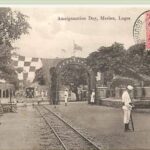Throwback – Amalgamation Day: Reflecting on Nigeria’s Journey as a Federation
Throwback – Amalgamation Day: Reflecting on Nigeria’s Journey as a Federation
On January 1, 1914, Nigeria’s political landscape underwent a pivotal transformation with the amalgamation of the Northern and Southern Protectorates by the British colonial administration. This historic event marked the beginning of Nigeria’s journey as a unified federation, setting the stage for the nation’s complex and multifaceted development.
The Origins of Amalgamation
The amalgamation was primarily driven by administrative and economic considerations. The British sought to streamline governance and reduce the cost of managing their vast colonial territories. By merging the protectorates into a single entity, they aimed to create a more cohesive administrative structure, laying the groundwork for modern Nigeria.
Post-Independence Challenges
Nigeria gained independence from Britain on October 1, 1960. The amalgamation laid a foundation for the nation’s federal structure, but the journey to unity was fraught with challenges. The diverse ethnic, cultural, and religious composition of Nigeria presented a complex tapestry of interests that required careful balancing.
Political and Economic Development
Over the decades, Nigeria has experienced both significant achievements and considerable obstacles. The federation allowed for a degree of regional autonomy, which facilitated regional development and political representation. The discovery of oil in the 1950s catalyzed rapid economic growth, transforming Nigeria into one of Africa’s largest economies.
However, this growth came with challenges. The wealth generated from oil often exacerbated regional inequalities and contributed to political instability. The Nigerian Civil War (1967-1970) was a stark reminder of the tensions inherent in the federation, highlighting the need for greater unity and equitable resource distribution.
Modern Developments and Reflections
In recent years, Nigeria has continued to evolve as a federation. Efforts have been made to address regional disparities and promote national integration. The establishment of various federal and state-level institutions has aimed to create a more balanced approach to governance and development.
Reflecting on Nigeria’s journey as a federation reveals both progress and ongoing struggles. The nation has made strides in economic development, democratic governance, and social progress. Yet, challenges such as corruption, regional tensions, and infrastructural deficits persist.
Looking Ahead
As we commemorate Amalgamation Day, it is crucial to recognize both the successes and the areas in need of improvement. Nigeria’s journey as a federation is a
TRENDING SONGS
 NPMA Appeals to Nigerian Government for Compensation After Lagos Market Fire
NPMA Appeals to Nigerian Government for Compensation After Lagos Market Fire
 Rest Every Four Hours, FRSC Issues Safety Guide for Fasting Motorists
Rest Every Four Hours, FRSC Issues Safety Guide for Fasting Motorists
 NNPC Boss Ojulari Bags UK Energy Institute Fellowship
NNPC Boss Ojulari Bags UK Energy Institute Fellowship
 Shock in Anambra: Bride Disappears Moments Before Wedding
Shock in Anambra: Bride Disappears Moments Before Wedding
 Nigerian Woman Returns ₦330 Million Accidentally Credited to Her Account
Nigerian Woman Returns ₦330 Million Accidentally Credited to Her Account
 APC Don Reach Morocco?’ VeryDarkMan Reacts to Seyi Tinubu Poster
APC Don Reach Morocco?’ VeryDarkMan Reacts to Seyi Tinubu Poster
 Bride Breaks Down in Tears as Wedding Meals Were Kept Secretly While Guests Go Home Hungry
Bride Breaks Down in Tears as Wedding Meals Were Kept Secretly While Guests Go Home Hungry
 Odogwu by Day, Robber by Night: How Marriage Joy Turned Into Tragedy
Odogwu by Day, Robber by Night: How Marriage Joy Turned Into Tragedy
 Nigerian Officials Allegedly Pocket N4–6B Weekly Through Smuggling Cartels at Seme–Badagry Border
Nigerian Officials Allegedly Pocket N4–6B Weekly Through Smuggling Cartels at Seme–Badagry Border
 Ahmad Yerima: Naval Officer to Face No Sanctions After Clash with Wike – Matawalle
Ahmad Yerima: Naval Officer to Face No Sanctions After Clash with Wike – Matawalle
Share this post with your friends on ![]()













